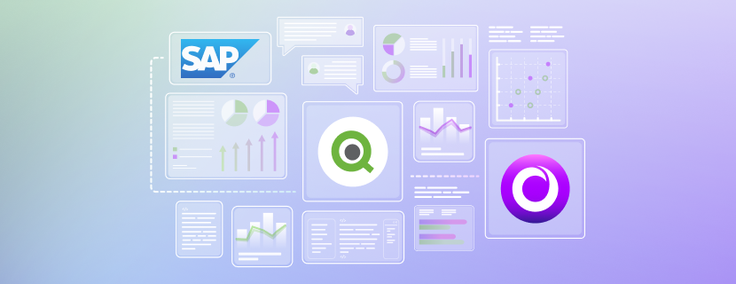
SAP is a leading enterprise resource planning (ERP) system that is used by businesses of all sizes around the world. As SAP systems become more complex and data intensive, it is becoming increasingly difficult for businesses to manage and analyze their SAP data effectively.
SingleStore and Qlik Replicate are two leading technologies that can help businesses overcome these challenges. SingleStore is a fast and scalable database that is designed to handle the demands of modern SAP workloads. Qlik Replicate is a real-time change data capture and data replication solution that helps businesses move and manage data across different sources and platforms.
When combined, SingleStore and Qlik Replicate offer a complete solution for managing and analyzing SAP data effectively. This blog post explores the benefits of using these two technologies together, and how they can help businesses get the most out of their SAP data.
Qlik & SingleStore Partnership: What It Means for Customers
In today’s modern data stack, it is important to be able to sync data across systems in a fast, predictable way and with the simplicity of setup and operation. This is primarily driven by:
- Technology stack modernization
- Business requirements
- Cost considerations
SingleStoreDB is a chosen data destination for modern analytical applications that help process real-time data and provide business insights. One of the common sources that leverages SIngleStore for real-time analytical needs is SAP systems. To move data from SAP, SingleStore leverages ecosystem partner tools.
Qlik Replicate and SingleStoreDB work together to provide real-time data replication and processing for SAP data. Qlik Replicate can extract data from SAP systems in real -time and replicate it to SingleStoreDB's , which can rapidly process large volumes of data.

SingleStoreDB also provides high availability and scalability for SAP data, ensuring that the data is always accessible and can be used for analytics and reporting.

Qlik Replicate can also complement SingleStoreDB’s real-time processing capabilities by enabling continuous data replication from SAP systems.
How Does the Integration Work?
Here is a video of Qlik Replicate sourcing data from a S/4HANA system via ODP and moving the data into SingleStore and then entering live CDC mode.
Let’s dive into how this integration works. Qlik Replicate supports connectivity to SAP systems through various protocols, including SAP's Remote Function Call (RFC) protocol and the SAP Java Connector (JCo). This enables Qlik Replicate to extract data from various SAP modules, such as SAP ECC, SAP S/4HANA, SAP BW and SAP HANA. Qlik Replicate has also added SAP ODP (Operational Data Provisioning) support as of the November 2022 release.

Qlik Replicate's SAP connectivity also supports various data extraction methods, including Full Load, Incremental Load and Change Data Capture (CDC). Full Load extracts all the data from a SAP system, while Incremental Load extracts only the changed data since the last extraction. CDC captures data changes in real time and replicates them to target systems immediately, enabling real-time analytics and reporting.
For the demo, we connect to SAP S/4HANA using ODP connectivity.

We then use Qlik Replicate’s named connector for SingleStore as a target prebuilt into the software.

Our CDC/Replication is now ready to RUN after we select some tables/extractors to source from.

That’s it! That's all it takes to synchronize data from SAP to SingleStore using Qlik Replicate!
Key Benefits
- Improved Performance. SingleStore's Workspaces feature allows multiple workloads to coexist on a single cluster without resource contention. When paired with Qlik Replicate's real-time data integration from SAP workloads, this means you can execute multiple tasks concurrently without sacrificing performance. As a result, you have the ability to derive insights faster, improving operational efficiency and decision-making.
- Scalability and Flexibility. SingleStore separates compute and storage, which allows you to independently scale each based on your needs. This, coupled with Qlik Replicate's ability to seamlessly interface with various systems — including SAP —ensures your data infrastructure can grow with your business without compromising interoperability or performance. The scalability also enhances reliability, as you can add or remove compute resources without impacting your data storage.
- Real-Time Insights Through Data Streaming. Qlik Replicate Change Data Capture (CDC) technology can stream real-time data changes from SAP systems into SingleStore. Combined with SingleStore's in-memory rowstore and disk-based columnstore, you can process and analyze data instantly, leading to more timely and informed business decisions.
Ease of Use and Reduced Complexity. SingleStore's unified database reduces the need for multiple specialized systems, simplifying your data architecture. When integrated with SAP through Qlik Replicate, managing and analyzing your data becomes a more straightforward process. This simplified architecture results in less time spent on data management and more time for deriving valuable insights.
- Robust Security and Compliance. Both SingleStore and Qlik Replicate prioritize data security, ensuring your SAP data remains protected during replication and storage. SingleStore provides role-based access control, ensuring only authorized individuals can access sensitive data. Qlik Replicate maintains data integrity during transfers, minimizing the risk of data breaches. Together, they help your business comply with data protection regulations and standards, reducing potential legal risks.
Conclusion
Together, Qlik Replicate and SingleStore offer a powerful solution for organizations that need to capture, process, and analyze large volumes of SAP data in real-time. The combination of real-time data replication and high-performance analytics enables organizations to gain timely and accurate insights from SAP data, and make informed decisions that can drive business growth and success.
You can also learn more about Qlik Replicate on SingleStore Connect.





